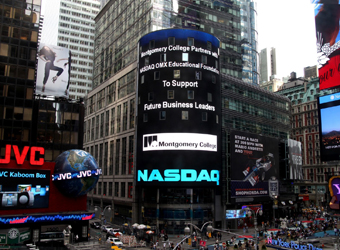U.S. stocks ended lower on Monday as declines in technology stocks offset gains in energy stocks.
Stocks extended losses, gold jumped and Treasury yields fell in late morning trade after North Korea’s foreign minister Ri Yong Ho said U.S. President Donald Trump’s latest comments amounted to declaring war on North Korea and that the rogue state has the right to shoot down strategic U.S. bombers even if they are not in North Korean airspace. Later Monday, White House press secretary Sarah Huckabee Sanders said “we have not declared war on North Korea,” calling the suggestion “absurd.”
“I think the market got a little nervous about that,” said John Caruso, senior market strategist at RJO Futures. “On top of the German elections it makes the market a bit unsure right now.”
The major U.S. stock indexes recovered some losses in the close. The Dow Jones industrial average closed 53.50 points lower, or 0.24 percent, at 22,296.09. McDonald’s, Visa and Boeing had the greatest negative impact on the index, followed by Apple. Home Depot, Exxon Mobil and Walt Disney had the greatest positive impact.
Information technology had its worst day since August 17, falling 1.4 percent as the greatest decliner in the S&P 500, which declined 5.56 points to 2,496.66. Energy led six sectors higher and closed up nearly 1.5 percent.
The Nasdaq composite briefly fell more than 1 percent but closed 0.88 percent lower at 6,370.59 in its worst day since September 5.
Apple shares fell for a fourth straight day, down 0.88 percent. The stock fell 5 percent last week, its worst week in more than a year, after Friday’s launch of the iPhone 8 and some other products in stores. The stock remains up nearly 30 percent for the year.
Facebook shares closed 4.5 percent lower in their worst day of the year. The social media giant dropped a proposal for the social media giant to issue a new class of shares that would have allowed CEO Mark Zuckerberg to keep voting control and fund the company’s philanthropic efforts.
Other tech-related stocks also declined. Amazon.com fell 1.6 percent, while Netflix dropped 4.7 percent.
“It’s really more just people are positioned a certain way. Everybody starts to bring down their growth exposure at the same time,” said Ian Winer, head of equities at Wedbush.
As of the close, trade volume in the PowerShares QQQ Trust ETF, which tracks the Nasdaq 100, was on pace for its highest volume day since August 18.
As of Monday’s close, the Nasdaq composite was within 2 percent of its all-time high while the S&P and Dow closed within 1 percent of their record highs.
The CBOE Volatility Index (.VIX), widely considered the best gauge of fear in the market, climbed to 11.19, its highest since September 11.
Gold futures for December delivery settled up $14 at $1,311.50 an ounce. Intraday, gold hit its highest since September 20.
The iShares MSCI South Korea Capped ETF (EWY) fell more than half a percent, its fourth straight negative day.
U.S. crude oil futures surged 3.1 percent to settle at $52.22, the highest closing level since April. The gains followed those in brent crude oil, which hit a high for the year as traders bet on improving demand and extension of output cuts.
The small-cap Russell 2000 set a record close after hitting an all-time high of 1,455.22, surpassing the prior intraday high touched on July 25. Energy stocks such as Noble and Diamond Offshore Drilling were among the biggest gainers in the index after UBS upgraded the stocks.
Stocks opened lower Monday after populists gained ground in a Sunday election in Germany and investors weighed the likelihood of another interest rate hike this year.
“I think it’s a little disappointment [on] the German election, just the overall outcome,” said Jeremy Klein, chief market strategist at FBN Securities. It’s “getting maybe a little spooked. What’s the trend right now in Europe? Is the euro area fracturing a little bit down the line?”
German Chancellor Angela Merkel won a fourth term in office but her conservative bloc only secured 33 percent of the vote, its lowest share since 1949, according to Reuters. The far-right Alternative for Germany (AfD) took 12.6 percent of the vote and will become the first nationalist, right-wing party to enter the German parliament since World War II.
The euro traded lower near $1.1849. The German 10-year bund yield fell to 0.40 percent. Major European stocks closed mixed.
New York Fed President Bill Dudley said Monday morning the Fed is on track to gradually raise interest rates, since factors depressing inflation are “fading”. U.S. economic fundamentals are also sound, said Dudley, vice chairman of the Fed’s rate-setting committee.
In contrast, fellow committee member Chicago Fed President Charles Evans said in a separate speech that inflation is too low and raising interest rates too quickly would be a policy “misstep.”
Treasury yields traded lower, with the U.S. 2-year yield around 1.43 percent and the 10-year yield near 2.22 percent.
Another members of the Federal Open Market Committee, Minneapolis Fed President Neel Kashkari is scheduled to speak later Monday.
Yields rose last week after the Federal Reserve maintained their forecast for another rate hike this year and three hikes next year.
The Dallas Fed manufacturing index said its read on general business activity index rose in September to a seven-month high of 21.3.
Source: CNBC & Reuters
